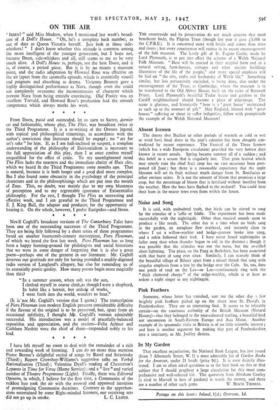" IesEN? " said Miss Modern, when I mentioned last
week's broad- cast of A Doll's House. " Oh, he's a complete back number, as out of date as Queen Victoria herself. Just look at those side- whiskers! " I don't know whether this attitude is common among the more intelligent, of the younger generation, but I hope not, because Ibsen, side-whiskers and all, still seems to me to be very much alive. A Doll's House is, perhaps, not the best Ibsen, and it is, of course, a period piece. But it is by no means a museum piece, and the radio adaptation by Howard Rose was effective on the air (apart from the tarantella episode, which is essentially visual) and poignant and absorbing as drama. Vivienne Bennett gave a highly distinguished performance as Nora, though even she could not completely overcome the inconsistencies of character which prevent Nora from being entirely convincing. Olaf Pooley was an excellent Torvald, and Howard Rose's production had the smooth :ompetence which always marks his work.
* * * *
From Ibsen, passé and outmoded, let us turn to Sartre, dernier err and fashionable, whose play, The Flies, was broadcast twice in the Third Programme. It is a re-writing of the Orestes legend, with topical and philosophical trimmings, in accordance with the author's conviction that literature should be engage ; no " art for art's sake " for him. If, as I am half-inclined to suspect, a complete understanding of the philosophy of Existentialism is necessary to the full appreciation of this play, then I at once confess myself unqualified for the office of critic. To my unenlightened mind The Flies lacks the neatness and the immediate clarity of Huis clos, which we heard i'n the Third Programme some months ago. That is natural, because it is both longer and a good deal more complex. But I also found some obscurity in the psychology of the principal characters and in the philosophisings which are put into the mouth of Zeus. This, no doubt, was mainly due to my own bluntness of perception and to my regrettable ignorance of, Existentialist philosophy. For the rest, I thought The Flies an interesting and effective work, and I am grateful to the Third Programme and E. J. King Bull, the adaptor 'and producer, for the opportunity of hearing it. On die whole, however, I prefer Euripides—and Ibsen.
* * * *
Nevill Coghill's broadcast versions of The Canterbury Tales have been one of the outstanding successes of the Third Programme. They are being fitly followed by a short series of three programmes based on another fourteenth-century masterpiece, Piers Plowman, of which we heard the first last week. Piers Plowman has so long been a happy hunting-ground for philologists and social historians that we were in some danger of forgetting that it is also a great poem—perhaps one of the greatest in our literature. Mr. Coghill deserves our gratitude not only for having provided a readily-digested radio version of Langland's allegory, but also for reminding us of its essentially poetic quality. How many poems begin more magically than this?
"In a summer season, when soft was the sun, I clothed myself in coarse cloth,as though I were a shepherd, In habit like a hermit, but unholy of works, I went forth into the world, wonders to hear."
(It is-not Mr. Coghill's version that I quote.) The transcription of Piers Plowman into modern English presents considerable difficulty if the flavour of the original is to be preserved, but, apart from an occasional infelicity, I thought Mr. Coghill's version admirably successful. His introduction was a model of gracefully-balanced exposiulen and appreciation, and the readers—Felix Aylmer and Cathleen Nesbitt were the Chief of them—responded nobly to his lead.
• * * *
I have left myself no room to deal with the remainder of a rich and rewarding week of listening. I can do no more than mention Pierre Bernac's delightful recital of songs by Ravel and Stravinsky (Third) ; Rupert Crawshay-Williams's suggestive talks on Verbal Rationalisation (Third) ; Valentine Dyall's reading of Chesterton's Lepanto in Time for Verse (Home Service) ; and a " live" and varied number of Theatre Programme (Light). Finally, there was Editorial Opinion, in which, I believe for the first time, a Communist of the reddest hue took the air with the avowed and approved intention of promulgating Communist doctrines. Contrary to the apprehen- sions entertained by some Right-minded listeners, our receiving sets


































 Previous page
Previous page